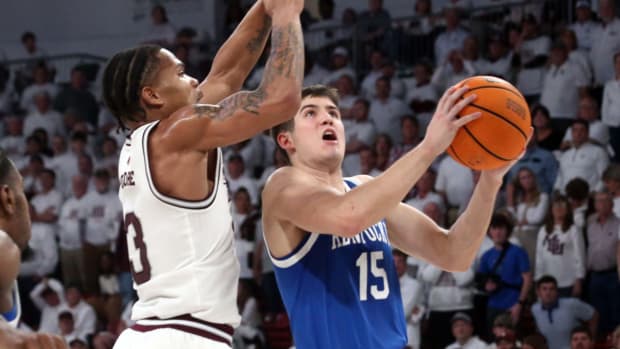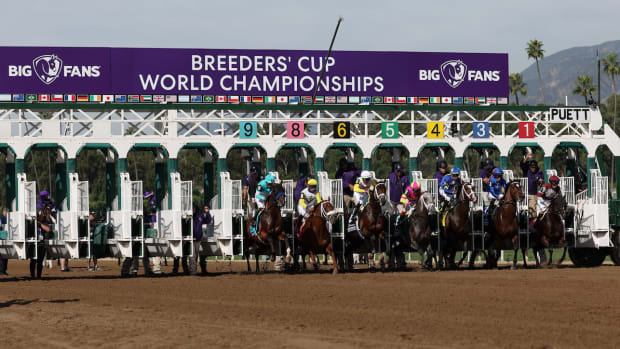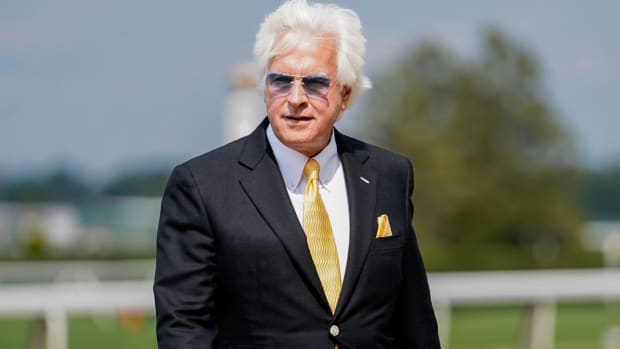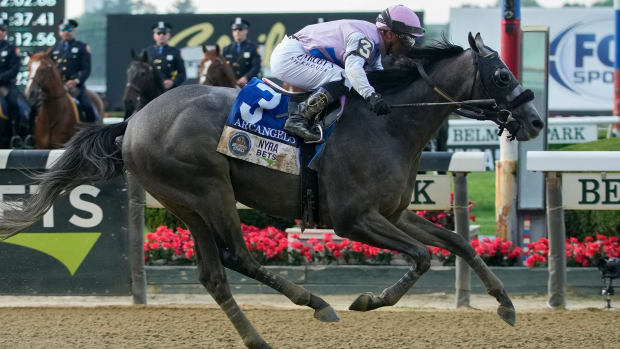DISQUALIFIED: Inside the Historic Decision That Shocked the Kentucky Derby
LOUISVILLE – They stood ankle deep in mud on the most famous racetrack in the world and they stood in the infield grass and they stood next to the little piles of manure in the long tunnel that separates the saddling paddock from the bowl inside Churchill Downs, beneath its ancient twin spires. They were thoroughbred horse trainers, they were jockeys, they were owners. It was dusk on the first Saturday in May, and a veil of grey twilight hung over the track and over the moment. Misty droplets of rain fell intermittently. The Kentucky Derby had been run for the 145th time and it had finished, and yet the outcome remained undecided. Minutes ticked past: Five, ten, fifteen, twenty. Forever, and then longer. On the giant infield screens, a single word was illuminated just brighter than the rest, or so it seemed: UNOFFICIAL.
They would wait and then wait some more and when it was finished they would all stand at the intersection of history and shock. Some of them would be deprived of the most important victory in American racing and others would be awarded that same victory. It would be a moment unlike anything before it, in this place, in this race, a moment that will outlive all of them and all of us. For the first time in the nearly century-and-a-half life of the Kentucky Derby, a horse would cross the finish line first, a horse named Maximum Security, and be disqualified for committing a foul in the race. Country House would be declared the winner at the second-longest winning odds in Derby history.
This is what had happened. Nineteen three-year-old colts had run 1¼ miles around a giant oval inside this cathedral of racing, as they have done in the spring of the year since 10 years after the end of the Civil War. On this day they ran on a racing surface turned to pale brown slop by the rain that began only in the 90 minutes before post time. They ran strangely, at first quickly and then in a beehive bunch, bumping and grinding along. “Like a little kids’ soccer game,” said five-time Derby-winning trainer Bob Baffert, whose three horses would finish fourth, fifth and 14th. One of them led by a tiny margin, towing the others. It was a bay named Maximum Security. He was one of those horses that should not win the Kentucky Derby, but sometimes does and sometimes becomes the favorite, as Maximum Security did on Saturday, at 4-1 odds. Just because.
Leaving the quarter pole at the head of the stretch, as more than 150,000 spectators, soaked by the rain, the bourbon and the beer, rose and roared in full throat, Maximum Security opened up his lead. Last December 20, Maximum Security had run in a $16,000 claiming race at Gulfstream Park in Florida, the first start of his life. He won that race by nine lengths and was not claimed (anyone at Gulfstream could have taken him for sixteen grand, no negotiation). “I said, ‘phew,’ ” said trainer Jason Servis, recalling that day. Maximum Security went on to win three more races, including the Florida Derby, to qualify for the Kentucky Derby as a genuine contender. There is no map for the trip from claimer to roses.
Maximum Security pulled away, ever so slightly, tiring less than the others. There was a moment of chaos near the top of the stretch. At least one jockey rose in his irons, a sign that a collision has been averted. In the mud and slop and in real time, it was difficult to interpret. Horse races are always difficult to interpret—giant animals running fast with brave and gifted small humans astride them. Maximum Security held together and won the Derby by one and three-quarter lengths over fast-closing Country House and three-quarters of a length over Code of Honor. The earth shook just a little as it always does and more so when it is the favorite who has won. He rides with more money on his back than the rest.
Maximum Security’s owners, Gary and Mary West, forty years in the game and winners of many big races but never the Derby, were hustled from their trackside box seats to the infield, where the victory celebration takes place. Servis followed and stopped on the racetrack, standing in the mud in his windbreaker for an interview. Then came the announcement, a part of racing everywhere that horses run, but so rarely in the Kentucky Derby: The jockeys on two beaten horses had claimed foul against the winner. Those jockeys were Flavien Prat, the 26-year-old Frenchman who rode apparent runner-up Country House; and Jon Court, an ancient 58 years old, the rider on Long Range Toddy, who had been in contention at the top of the stretch but faded to 17th place. Near the finish line, first Court and then Prat, bent over and talked into a land-line telephone to the three racing stewards who would determine the veracity of their claims. Both men said they had been impeded by Maximum Security at the quarter pole, as the field straightened for home.
“It got pretty gnarly out there,” said Court after hanging up the phone.
“When I was coming around the turn, he [Maximum Security] pushed my sideways,” said Prat. “He kind of bumped me.”
The OBJECTION sign was engaged on the board. The crowd gasped. In 145 Derbies, the horse that finished first had never been disqualified. A buzz fell across Churchill.
At the mouth of the tunnel, Country House’s trainer, Bill Mott, stood at attention. A bespectacled, 65-year-old man with a thinning shock of grey hair, Mott is among the most respected trainers in the game. He is a member of the Racing Hall of Fame and the winner of ten Breeders Cup races. But he had never won the Derby. After the midweek scratch of pre-race favorite Omaha Beach with a throat problem, and the departure of his much-liked trainer, Richard Mandella, Mott took the title of best trainer to have never won a major, as it were. But if he were to win the Derby, it was expected to be with Wood Memorial prep winner Tacitus, who went off at 6-1. Country House was 65-1. Mott had said three days before the Derby, “Tacitus is my best chance to win. Country House needs some things to happen.”
Some things indeed happened.
Time passed. The stewards debated in their perch above the high-rollers’ enclave called The Mansion, more than six stories above the track.
Mott was surrounded by media. “There was definitely a foul in the race,” said Mott. “My horses didn’t get bothered terribly, but there were a couple jocks that almost went down. There are 100,000 people (sic.) here. The stewards don’t want to make that call [to disqualify Maximum Security]. But I will say this: If this was a maiden claimer on a weekday, that horse [Maximum Security] would come down. It’s the Kentucky Derby, but it’s not supposed to matter.”
Across the racetrack from Mott, near the inside rail, Servis waited for the decision. A slender man with short, wispy, blonde hair, Servis is the older brother of John Servis, who 15 years ago trained Smarty Jones to an immensely popular Derby victory and nearly to the Triple Crown. Servis has long played the racing game at the grittier levels, transforming claimers into winners and trying to make winners into stakes winners. The last two years have been the best of his life. As the minutes crawled past, he shook his head and grinned painfully. He knows the racetrack. He knows the stewards.
“This is a long one,” he said of the delay. “I don’t think that’s a good sign.” Behind him the race replayed from multiple angles. “I haven’t seen a good angle,” he said. “But I don’t think my horse did anything to affect the outcome of the race.”
Nearby, Maximum Security’s jockey, 27-year-old Panamanian Luis Saez, was also surrounded, whispering short responses to incessant questions. He looked like a man in pain, holding roses (not literally) in his hands, sensing that they would soon be taken away.
At 7:16 p.m., three seconds shy of 22 minutes after the finish of the race, the UNOFFICIAL sign blinked to OFFICIAL and Country House’s No. 20 was elevated to No. 1, winner of the Kentucky Derby. The crowd booed forcefully, perhaps at the perceived injustice, but more likely at tickets left uncashed. More than two hours after the finish of the race, the three stewards appeared at a press conference. Barbara Borden, the Kentucky Horse Commission’s chief steward, nervously read a 107-word explanation of the disqualification of Maximum Secruity and did not take any questions.
Borden first confirmed what had been seen: “The riders of the 18 (Long Range Toddy) and 20 (Country House) horses in the Kentucky Derby lodged objections against the seven (Maximum Security), the winner, due to interference turning for home, leaving the quarter pole.”
Pause: Here is what the head-on replay (not the so-called “pan” shot that is commonly shown on television) seemed to show: That as the field began to straighten, Maximum Security darted to his right at least three “paths” (a path being a running lane). As he made this move, he passed directly in front of War of Will, who had been gathering for a potential move toward the front. This move caused War of Will’s jockey, Tyler Gaffalione, to check his mount to keep both rider and horse from falling, which, given their place in the field, would have been disastrous. Maximum Security’s move in front of War of Will forced War of Will in front of Long Range Toddy, a 55-1 shot who Court was forced to steady in similar fashion to Gaffalione. “I got knocked sideways,” said Court, “and then I got knocked sideways again.”
Finally, both War of Will and Long Range Toddy continued to slide sideways, nudging Country House at least one path wide, but less dangerously than the other two. All of this transpired in just more than a second. But it was a moment fraught with danger in a year when horse racing suffered mightily from too much death (the 23 horses who died at Santa Anita between Dec. 24 and March 31).
Chief steward Borden said, “We had a lengthy review of the race.” Indeed. More Borden: “We determined that the seven horse (Maximum Security) drifted out and impacted the progress of the number one, in turn, interfering with the 18 and 21 (Bodexpress, the longest shot in the field at 71-1). These horses were all affected, we thought, by the interference. Therefore we unanimously determined to disqualify number seven (Maximum Security) and place him behind the 18, the 18 being the lowest-placed horse that he bothered, which is our typical procedure.”
The result of the disqualification and re-placing left Country House in first, Code of Honor in second and Tacitus in third, giving Mott the first- and third-place finishers.
The decision is likely to be debated further, probably endlessly. What’s unknown is unknown forever, but it seems unlikely that Country House would have caught Maximum Security no matter how far they ran. War of Will is another matter. But it’s difficult to imagine the carnage that would have ensued if Gaffalione had not kept War of Will upright. However: It is baffling that the stewards watched that rodeo and did not instantly initiate a stewards’ inquiry into the finish, which is standard practice when there might have been fouls. Also: For the stewards to refuse questions after changing the order of finish in the Kentucky Derby for the first time in history is a terrible look that will not age well.
Nearly an hour after the race, Gary West met with Servis. Both men claimed to have not seen a satisfactory replay of the race, which is surprising considering the number of times it was replayed on the giant infield screen. West is known throughout racing as a class act who has given more to the game than it has given him. His Derby pain goes back 16 years to when contender Buddha was scratched in race week. But he was not immediately accepting of this outcome. “I’ve seen $5,000 claimers have much worse problems than this horse and not get qualified,” West said. “I think it was a very bad decision. I might change my mind.”
His mindset remained fluid. Minutes later, after Servis talked with the stewards, West and Servis both said they would consider any appeal of the disqualification. It is unclear what avenues would be available, but as night fell on Louisville, it remained possible that the Derby would be contested beyond the First Saturday in May.
In aftermath of the decision, Mott moved slowly across the racetrack, in possession of the Derby, a race that he had listened to as a boy in South Dakota. He never envisioned it happening like this, and nor did the rest of us. “I really didn’t want to win this way,” he said. “I wish he had pulled away nice and clean and won by five.” Mott shrugged. “This is what happened.”
The mud pulled his feet deeper into the track and brown water pooled at his ankles. Fans shuffled toward distant parking lots and long rides home. A light wind whispered across the earth and the skies grew ever darker, a curtain falling noiselessly on a theater of the surreal.









